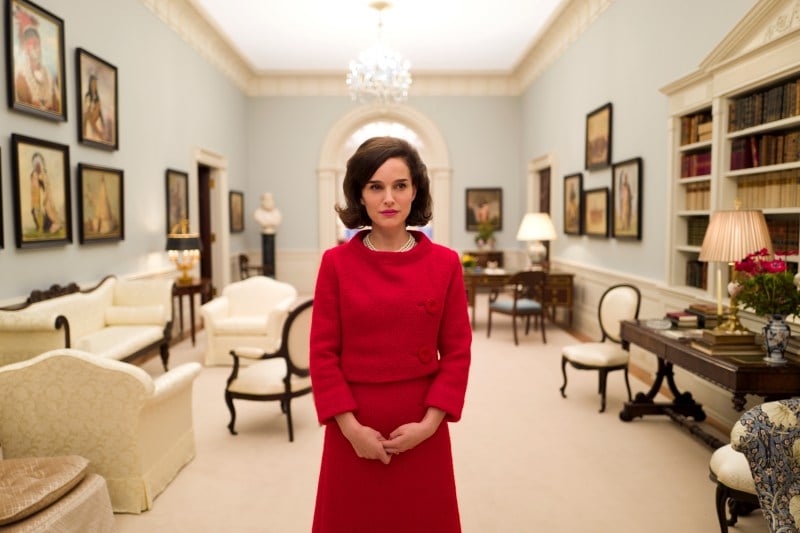Towards the middle of Pablo Larraín’s “Jackie,” First Lady Jackie Kennedy announces that she would like to stage a grand funeral procession to honor her murdered husband. President Johnson’s security detail is concerned. What if President Kennedy’s assassination was just the first event in a wide-ranging conspiracy? A Secret Service member tells Attorney General Robert Kennedy about his fears. Kennedy tells him that they will go through with Jackie’s plan, then dismisses his rebuttal with a curt “fuck off.” The woman sitting behind me in the movie theater gasped. “The Kennedys didn’t use language like that!” she exclaimed.
Her comment is a testament to Jackie Kennedy’s myth-making. Indeed, while the film’s depiction of the Kennedy assassination and its aftermath is tired and clichéd, one consistent strength in this uneven film is its focus on Jackie Kennedy’s attempts to memorialize her husband and secure his place in history.
Larraín’s film illustrates three crucial moments in Jackie Kennedy’s tenure as First Lady: the 1962 televised tour of the White House she conducted, the Kennedy assassination in Dallas and the aftermath of the assassination. Larraín links these events through the medium of television. Jackie Kennedy won an Emmy for her White House tour. The 1963 television coverage of the assassination of JFK proved so monumental that it has been revisited and explored in everything from Oliver Stone’s complex and conspiratorial “JFK” to Peter Landesman’s anemic “Parkland.” And the subsequent images and videos of Jackie Kennedy in her bloodstained pink jacket, President Johnson being sworn in on Air Force One and the funeral procession leaving the Capitol remain deeply imprinted in the American consciousness.
Throughout “Jackie,” Larraín examines the divide between these public images and the First Lady’s private life – and Natalie Portman presents Jackie Kennedy as an ideal wife, an ingenious politician and a vulnerable human being. In public, First Lady Jackie Kennedy seems classy and passive, a woman who enjoys the best of everything but defers to the stronger men in her life. In private, when confronted, she proves to be cold, calculating and persistent. In the days following the assassination, she is filled with anxiety, fear and grief. Larraín’s film jumps back and forth in time between these three events, allowing Portman to explore all of the faces of the First Lady, and make this legendary woman seem human and vulnerable.
In “Jackie,” Larraín questions if the public images of the Kennedy presidency represent an authentic version of history. Jackie’s tour of the White House may seem candid, but we see her rehearsing her lines to no end. Portman’s Jackie Kennedy knows that millions of Americans will be watching the funeral on television, and an early scene outlines her mission. She asks the ambulance driver what the assassinated Presidents Garfield and McKinley accomplished. The ambulance driver doesn’t know. Then, she asks him what President Lincoln accomplished. The driver replies he won the Civil War.
Jackie wants to ensure that President Kennedy is remembered like Lincoln, and does not end up in the “the dustbin of history” along with Garfield and McKinley. To this end, she studies Lincoln’s funeral and insists that her husband be buried at Arlington. In interviews in the days following the assassination, she espouses President Kennedy’s bravery and wisdom, and compares his time in office to Camelot. She works to hide anything that might tarnish her late husband’s mystique, from his affairs with other women to her smoking habit.
Natalie Portman delivers a stellar performance as Jackie, and her work allows Larraín to craft this nuanced portrait of a complicated woman. However, his clever examination of Jackie’s myth-making is hindered by a weak supporting cast. Indeed, most of their performances can be summed up with a single adjective each. As Robert Kennedy, Peter Sarsgaard is supportive. As Nancy Tuckerman, Greta Gerwig is demure. And as President Johnson, John Carroll Lynch is decisive. None of the other actors have as much material to play with as Portman does, and they seem to be phoning it all in. Larraín is unable to establish the environment in which the First Lady lived and worked because the people surrounding her seem lifeless. His portrait of the First Lady seems incomplete since we do not understand the context of her words and actions.
While Larraín makes many strong decisions, he also makes a few directorial choices that get in the way of his study. He decides to re-stage some of the most famous images of the assassination. Of course, the actors playing President Johnson and Robert Kennedy do not look exactly like their historical counterparts, so when Larraín presents us with his version of the photograph depicting President Johnson’s inauguration or Robert Kennedy walking down the Capitol steps after his brother’s funeral, it’s jarring. Larraín may want to make a distinction between myth and reality, but I would bet that most Americans interested in seeing “Jackie” are familiar with these mythical photographs. And Larraín should trust his audience to connect his fictional film with the historical images of the Kennedy assassination. These ill-conceived recreations take away from Larraín’s singular perspective on the assassination.
Despite these failings, “Jackie” is worth seeing. I expect that Natalie Portman will be one of the frontrunners for the Best Actress Oscar. Furthermore, Larraín’s emphasis on Jackie Kennedy’s myth-making seems timely. The Oxford Dictionary’s word of the year was “post-truth,” defined as a state in which “objective facts are less influential in shaping public opinion than appeals to emotion and personal belief.” As I watched the Jackie Kennedy of Larraín’s film whitewash her husband’s failings with her charm and taste, make her detailed funeral plans and create her legend of Camelot, I realized that she was one of the first, and most skilled, purveyors of post-truth politics.
Contact Amir Abou-Jaoude at amir2 ‘at’ stanford.edu.
